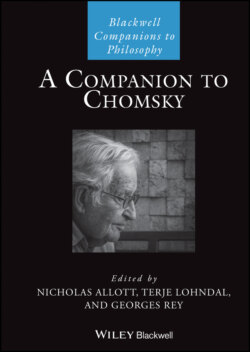Читать книгу A Companion to Chomsky - Группа авторов - Страница 13
1.1 Introduction
ОглавлениеNoam Chomsky is justly famous for his revolutionary contributions to linguistics, psychology and philosophy. He is in his 93rd year, and we thought it high time to provide an overview of the major achievements of his now more than 60‐year‐old research program and its prospects for the future. This is particularly pressing in the light of persistent rumors, encouraged by a number of authors1, that his program has proven bankrupt, “completely wrong,” and has been replaced by various sorts of proposals in general statistical learning and “functionalist/constructionist” linguistic theories (to which we return below).
We think these rumors are seriously mistaken. To be sure, the theory has evolved, displaying the kinds of complexities, revisions and increasing depth typical of any ongoing science. However, Chomsky's ideas and those of others working in his “generativist” framework are at the center of much of the most successful current work on the grammar of human language, and his work has been influential across many other areas of linguistics, including research on processing, language acquisition, language diversity and semantics. His program is one of the most important in the history of linguistics, and it has profound and enduring significance for psychology and philosophy, and indeed for our understanding of human nature generally.
This volume brings together views of Chomsky's legacy from the perspectives of many of his program's foremost practitioners, as well as some of his critics, in the many specific areas his work has influenced, including syntax, semantics, pragmatics, psycholinguistics and language acquisition, as well as philosophy of language, mind and science. It is divided into sections that address the main aspects of his work, each of which we will briefly summarize in this introduction.
Chomsky is, of course, also famous for his political writings. It is important to stress that these bear no direct connection to his linguistics, and lack of space here ruled out an entire section that would begin to do them justice. But we have at the end included one excellent and unusual discussion by Joshua Cohen and Joel Rogers of some of the enlightenment ideas that seem to inform both the politics and the linguistics.
All the chapters here are intended to be accessible to people not expert in the topics of the papers. All should be readable by linguists, philosophers, psychologists, and the general public interested in the present status of Chomsky's work in the many areas we have mentioned. Therefore, they do not presuppose extensive technical knowledge of linguistics, although since the papers are short, some do get more technical toward the end.
